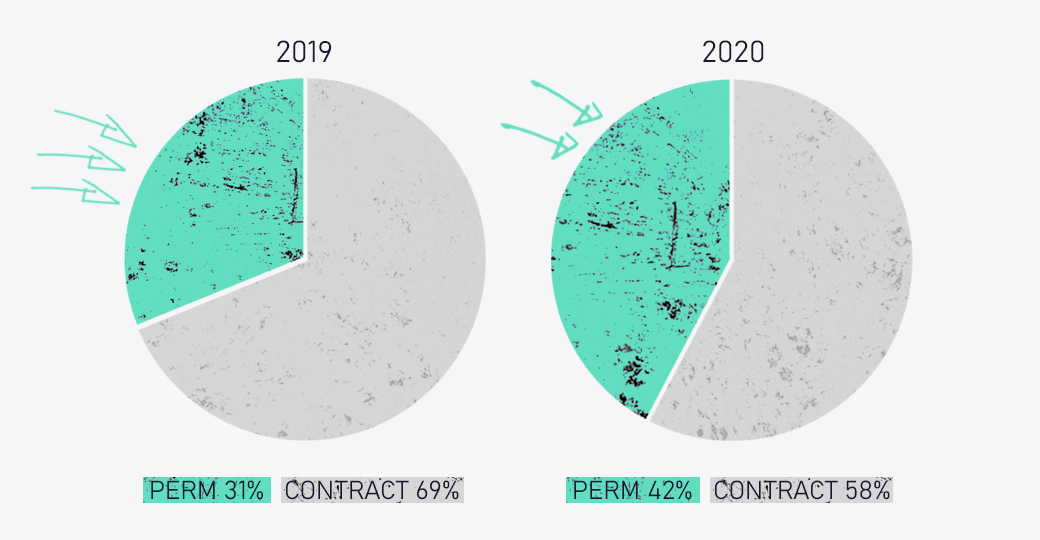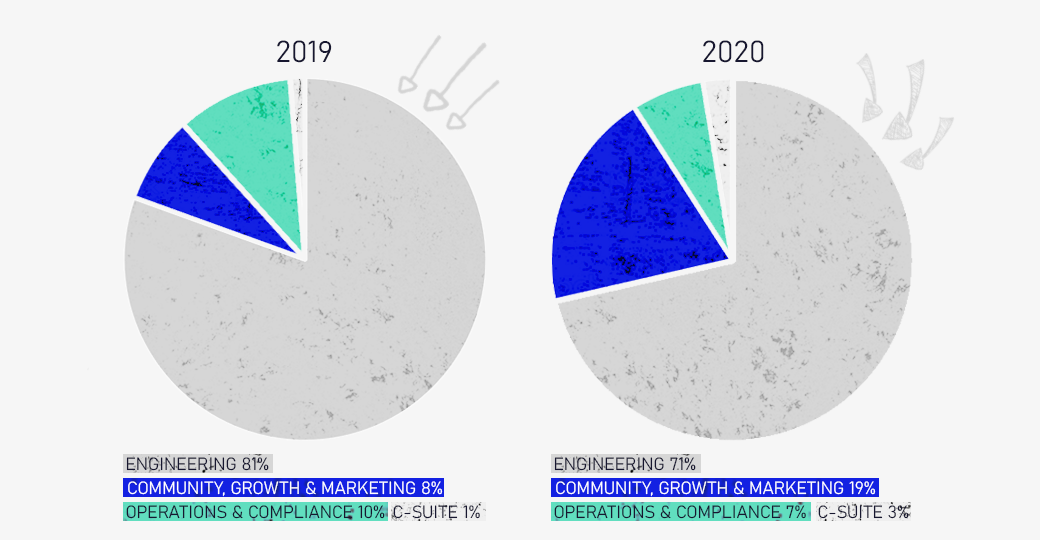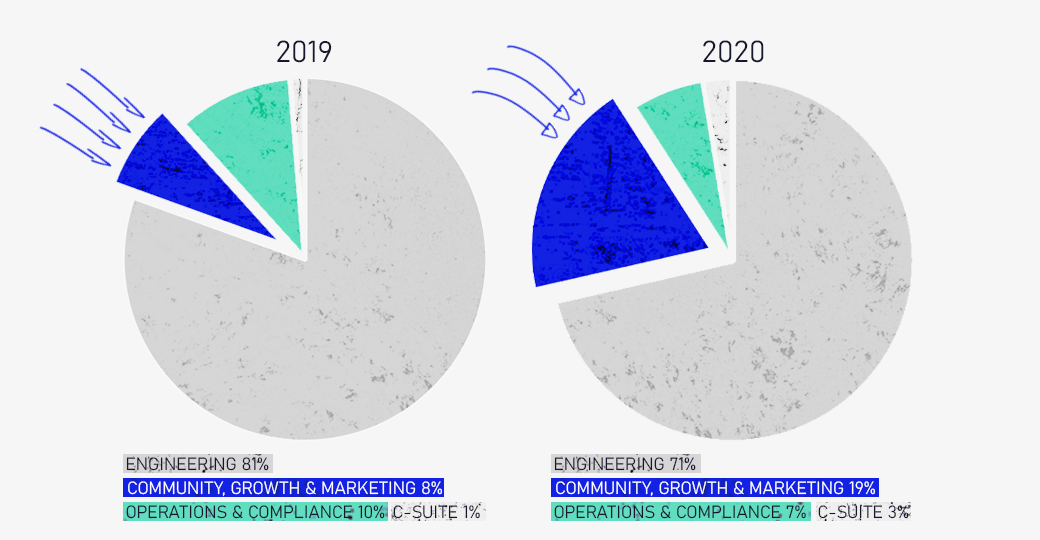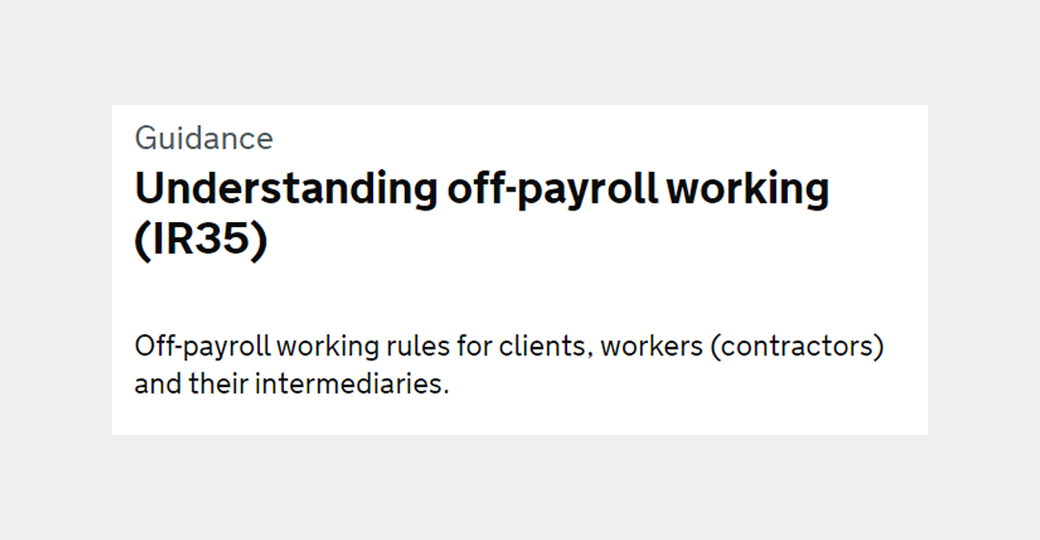
4 Ways Blockchain Companies Changed Their Hiring Strategy in 2020
- Posted: 04.02.21
Today we’re going to analyse the four main ways that Blockchain organisations changed the way they hired (and who they hired) in 2020.
2020 brought a lot of challenges for businesses, and Blockchain organisations were not exempt from the quickly changing landscape.
Funding a crypto start-up has dramatically changed over the past 12 months too – we investigated how crypto start-ups manage their funds in this article.
Hiring strategies were adapted pretty significantly over the past 12 months.
Permanent employees became more common, engineering became less of a priority and we saw an increase in work from the USA.
We’ll discuss the reasoning behind this shift and what it means for your Blockchain company.
Let’s get right into it:
Permanent placements have become more common for our partners
This stat really took me by surprise.
The rise of the gig economy and uncertainty due to the global pandemic lead me to believe shorter term temporary contracts would be sought after (this allows companies more control over their cash flow and forecasting).
But interestingly, permanent employee requirements increased by 11% in 2020.
We investigated further and came to the conclusion that there are two main reasons for this:
1. The introduction of IR35
2. Start-up headcount being important for growth targets
The IR35 legislation has changed the way tax works for contractors in businesses, and as a result of this typical contractors are prioritizing permanent employment for ease and security.
We promise the next reason is a little more exciting:
Contractors in most cases don’t count towards to headcount of start-up (or any company).
This becomes important when you have to hit growth targets to secure future funding – VC’s will often use headcount as a way to measure growth within a business.
So hiring permanent employees is a good indicator of projected growth and sustainability.
These two factors saw permanent placements into our partners go from 31% to 42%.
 Internal data from Plexus
Internal data from Plexus
Our expertise in the Blockchain market had a huge impact in the next point:
Engineering requirements reduced by 10%
Let me be clear:
This is not to say engineering teams aren’t still rapidly growing (they still made up 71% of our placements).
We just had a broader scope of roles to fill in 2020.
 Internal data from Plexus
Internal data from Plexus
Plexus as a company started focusing more on the Blockchain industry and really specialising in that market.
This laser focused approach meant we started working on roles outside of the core engineering function.
Our partners hired us for roles like Community Managers, Compliance and Operations to build a well-rounded Blockchain company.
The maturity of Blockchain organisations also had a huge part to play in hiring strategy:
Marketing, community and growth became essential for success
This was also a contributing factor to the engineering placement ratio being reduced.
Building a reliable, solid product is often the main goal of a young Blockchain company.
But as time goes on and the product starts to attract more casual users, community and marketing becomes ultra important.
 Internal data from Plexus
Internal data from Plexus
Ensuring users feel comfortable with the product and are making full use of all the features is key to growth and continued use.
Enabling users to take advantage of all your features will help you stand out in a crowded market, and users feeling comfortable with the product will promote extended use.
The growing number of customer facing blockchain products is also placing more of an importance on marketing and employer branding.
There’s a lot of movement in the space, and blockchain organisations need to get heard.
The best way to get heard at the moment is by building a community, and you’ll build this successfully through marketing.
Want further insight to hiring in the crypto space?
Download our State of Crypto Hiring Report to explore salaries, how long it takes to hire and which areas are important for growth.
The next point allowed us to work with partners in new time zones:
Roles in the USA were new to Plexus
This one is pretty simple.
Blockchain was already a remote heavy industry before 2020 came around, but now it’s extremely common to have completely remote teams based around the world.
Blockchain organisations in the USA are now way more open to hiring fully remote candidates than before, which has allowed us to engage our established networks and help build their teams.
This meant our activity in the USA increased for 2020 compared to 2019.
Those are the four major changes we saw in hiring strategies for Blockchain organisations in 2020.
2020 was challenging for many businesses; agility, quick decision making and shifting strategies was vital to keep ahead.
We post data around hiring topics for Blockchain and DeFi companies a little more frequently on our LinkedIn page.
We also post our latest roles there first – connect with us!
